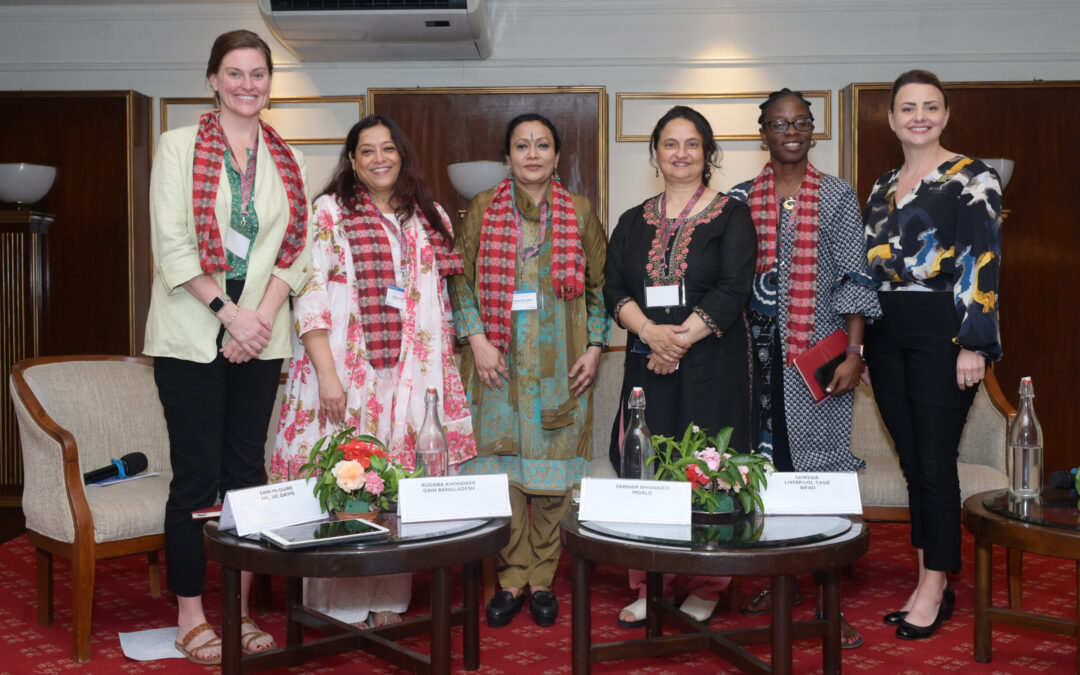Diversity, Equity, and Inclusion (DEI) are core values of the Feed the Future Food Systems for Nutrition Innovation Lab (FSN-IL) and are integrated into every aspect of FSN-IL’s work, from its organizational structure to its research for development (R4D) activities and research funded through its competitive awards, human and institutional capacity enhancement, and engagement activities in the focused geographies.
FSN-IL is a consortium of 17 world-class partners which leverages the vision, experiences, perspective, and investments of each partner, enhancing outreach, scaling up and ensuring access to country specific knowledge that prioritize local needs and explore potential opportunities.
“Our consortium consists of a diverse set of actors, including US academic partners including minority serving institutions, think tanks, global technology innovation and scaling partners, and value-chain partner. Further, we engage with host country institutions, both academic and policy to support localized food systems actions in research and capacity development” says Dr. Shibani Ghosh, Director of FSN-IL.
COLLABORATIVE EFFORTS WITH THE 1890 UNIVERSITIES FOUNDATION
One of FSN-IL’s notable key partners and collaborators includes the 1890 Universities Foundation (the 1890s Foundation) – an educational organization that supports the core missions of research, extension, and education across the nineteen 1890 Land-Grant Universities. This partnership led to the creation of the first Minority Serving Institution (MSI) Student Working Group.
“This is one of my favorite projects,” says Elizabeth Marino-Costello, Senior Program Manager of FSN-IL and a key player overseeing the success of the group. “The six selected students for this first cohort are outstanding. They are top academic performers in their Master’s and PhD programs who are passionate about food systems related to global nutrition development. They are eager to add more opportunities in the global nutrition sphere for all students in the 1890 Universities interested in learning more about food systems, and ultimately, global career opportunities.”
By working closely with the 1890 Universities Foundation staff, Quintin Gray, and the faculty advisor, Judith Boateng, for the student-led working group, FSN-IL can identify student needs related to leadership and career-building opportunities in the food systems space, identify current gaps in their curricula, and plan for webinars and/or workshops to enhance knowledge for these students interested in working in this area.
EMPHASIS ON CROSS-CUTTING THEMES IN RESEARCH
Another key activity of the Lab is funding competitive awards for research for development, all of which include an emphasis on at least one of FSN-IL’s cross-cutting themes of gender and youth, nutrition outcomes in vulnerable populations, and/or climate-smart and resilient food systems.
Since 2010, the then Nutrition Innovation Lab and the current Food Systems for Nutrition Innovation Lab projects, both managed by Tufts University, have been advancing applied research to promote health and nutrition of women and young children.
“FSN-IL has always placed a huge emphasis in driving research through a locally-led approach, leveraging their deep understanding of the local context, including socio-cultural dynamics, and environmental conditions,” says Dr. Robin Shrestha, Associate Director of FSN-IL. “The groundbreaking work on mycotoxins in Nepal, Uganda, and Mozambique, policy process and quality of governance on nutrition policy implementation in Nepal and Laos, and effectiveness of multisectoral nutrition program on nutrition outcomes in Nepal, Bangladesh, and Uganda are some of the initiatives led by local partner institutions, mostly women and youth. This approach has, over the years, made FSN-IL’s generation of evidence rigorous, groundbreaking, and both relevant and effective, says Dr. Shrestha
PROMOTING DEI GLOBALLY THROUGH LEADERSHIP
FSN-IL also strives to promote the principles of DEI through its leadership and influence. Most recently, FSN-IL hosted the 2024 Innovation Lab (IL) Council Regional Partners’ Meeting in Kathmandu, Nepal, which focused on Translating Research to Action: Opportunities for Evidence Based Scaling of Agri-Food Systems Innovations. As Chair of this year’s IL Council, Dr. Shibani Ghosh was dedicated to setting an agenda that featured the voices of women leaders working in agri-food systems, providing a platform for them to share their perspective and insights with the broader IL and USAID community.
“The goal of this session was to highlight the pivotal role of women leaders in agri-food systems research, development, and policy,” says Dr. Ghosh. Women leaders from Nepal, Bangladesh, Nigeria, and the United States shared reflections from their experiences in influencing that to expand women’s leadership moving forward and best practices to promote gender equity, diversity, and empower women working at all levels in agri-food systems.
WAY FORWARD
Ultimately, by bringing a diverse set of voices to the table, designing research that promotes gender inclusivity and involves youth, and actively integrating DEI values throughout our wide-ranging agenda, FSN-IL aims to help foster a culture of belonging among its core team, partners, global, and national stakeholders, and advance its ongoing efforts on sustainably scaling food systems innovations to ensure safe, healthy, and sustainable diets, and improved nutrition for all.
—
Disclaimer: This blog post is made possible by the generous support of the American people through the United States Agency for International Development (USAID) under the Feed the Future initiative. The contents are the responsibility of the Food Systems for Nutrition Innovation Lab and do not necessarily reflect the views of USAID or the United States Government.

